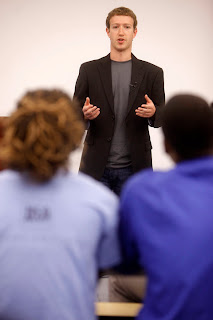Brigham Young University will be hosting Mark Zuckerberg, founder of Facebook, at a technology forum in the Marriott Center 11am on Friday, March 25, 2011. He's being accompanied by Senator Orrin Hatch, and the topic will be the opportunities and challenges of the digital age.
Our university community is invited to attend and to ask questions, submitting these, appropriately, via BYU's Facebook page. I hope some of my students from Digital Civ will attend the event and perhaps engage our guests on some of the topics that we explored pretty well, I believe, during our Fall 2010 History of Civ course.
I wonder what my digitally-informed students might ask these guests. Here are the questions I've been posting on the BYU Facebook page:
- How open to "open" is Facebook?
The Internet is literally built upon open source software (such as Apache, which runs the majority of web servers), and there is a culture of openness that seems native to the net (Stewart Brand's "Information wants to be free"). Facebook seems to be going in an opposite direction, extending the "walled garden" model of vertical integration (in a way, like Apple). Will Facebook be committed to interoperability (for example, allowing easy export of one's profile, Facebook friends or other user-generated content), or must people do social networking only on Facebook's terms? - Will Facebook stay political neutral?
Facebook is being used as a primary tool for activism and political protests worldwide. Has Facebook been pressured by governments either to shut down cyberactivism, or to cooperate with governments in leading authorities to trouble makers? This issue was explored in a recent episode of the TV series, The Good Wife ("The Great Wall") with the implication that business interests will keep media giants like Facebook cooperating with oppressive foreign governments. How do you respond? (This question is inspired by my student Allison Frost and her blog about China and the Internet) - Should higher education be managed like a startup?
The Startup:Education foundation that you launched in Sept. 2010 is based on the idea that "School districts need more autonomy and clearer leadership so they can be managed more like startups than like government bureaucracies." Do you believe this is equally true of higher education? How could colleges accomplish their goals better by reorganizing in this way? Are social media a way to route around the bureaucracies of education, or a way for schools to sustain the status quo? - How can social media like Facebook help achieve the Obama administration's goal of transparency and open government?
(A question for Senator Hatch). Pres. Obama's administration has committed itself to transparency and open government, yet government entities are reluctant to allow employees to use social networking for official purposes. Issues preventing government adoption of social media include privacy, crossing the lines between official and personal communication, and even the practical question of archiving Facebook updates if they become part of the public record. What's being done within government to take advantage of the powerful new social media? - Should scholars use social media like Facebook to share their findings?
(A question for both Mr. Zuckerberg and Senator Hatch). The government has begun to require that publicly funded research be made publicly accessible, yet scientists and scholars do not recognize social media like Facebook as serious ways to make their work accessible. If professors shared their work through services like Facebook (before or after formal publication), would this make their research less or more valuable?
